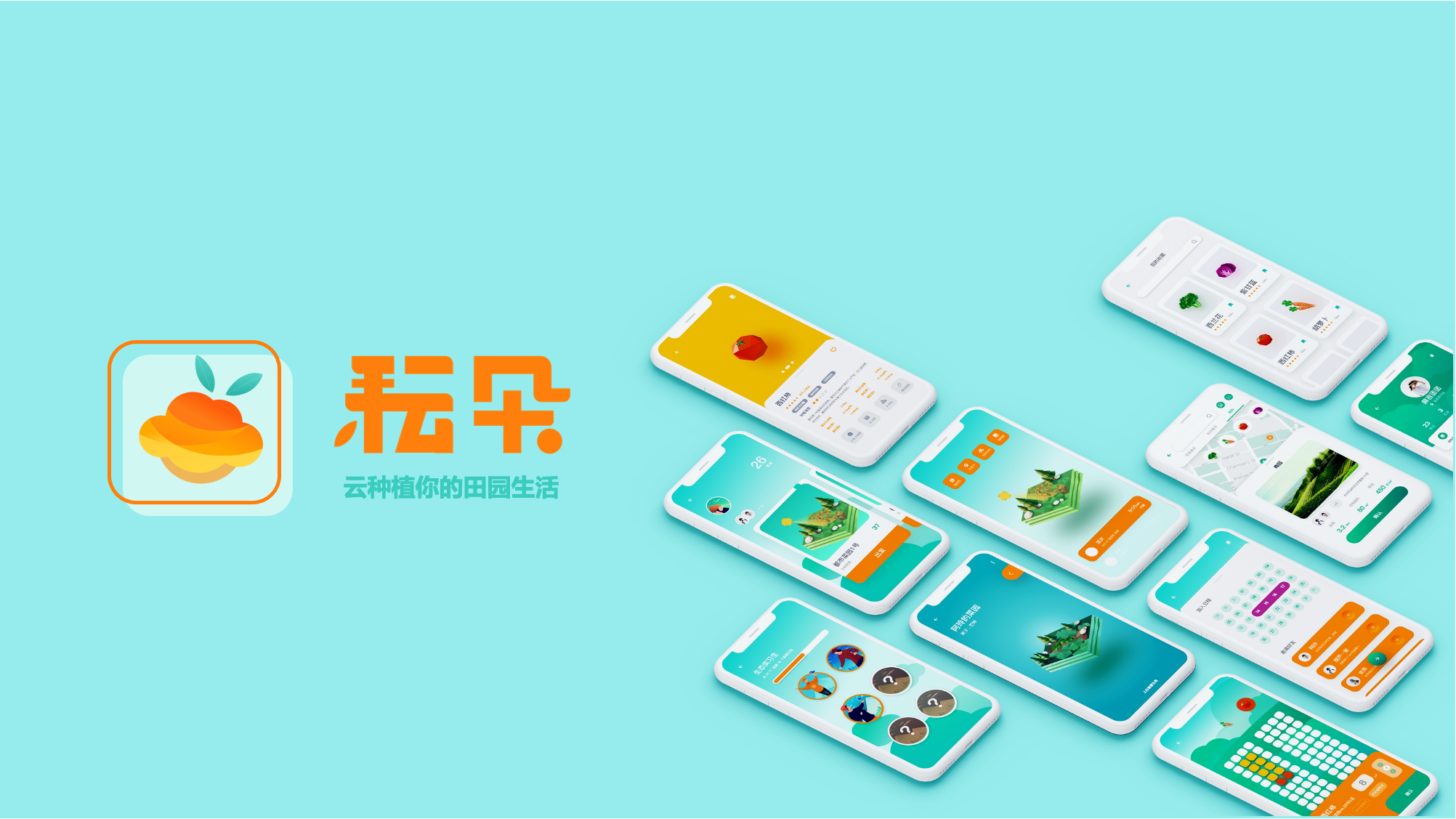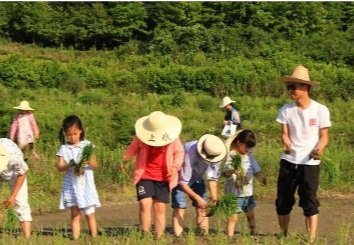
COMPETITION PROJECT
Cloud Farm
User-centred Design
In this competition project, we were addressing the challenges of getting children engaged more with nature through gardening activities.
Cloud Farm is a interactive and social platform that combines online and offline gardening experiences for families with children, aiming to provide a high-quality, convenient, and trustworthy experience for families who want to learn about nature and have fun.
Contexts
Timeline: May 2020 -Aug 2020
Team: Ji Wang, Yesheng Yu, Lingyan Chen
Tools:
Background Review
Competitors Analysis
User Research & Demand Analysis
Creating storyboards
Low-fi prototype
High-fi design
My Role

Problem
Due to the utilitarian nature of modern education, children's spare time is still filled with learning, and they lack opportunities to get close to nature. And that can lead to inattention, emotional regulation and poor environmental adaptability.
How might we get children engage more with nature through gardening experience?

Process
Background
Lack of natural education for children
In 2013, a report released by the Shanghai Oasis Ecological Protection Exchange stated that among the more than 1,300 children surveyed, 12.4% have a tendency towards nature deficit syndrome. The utilitarian nature of modern education, combined with the fact that children's free time is still filled with studying, means that they lack opportunities to be close to nature.
——"Report on the Intimacy of Children with Nature in the City"
Increased demand for eco-farm parent-child activities
In 2017, the participation rate in parent-child activities saw a rise of 13.7% compared to previous years. Families have become more demanding and seek a wider variety of experiences. Eco-farm parent-child activities provide not only a chance for urban parent-child families to connect with nature, but also an opportunity to fully utilize the potential of agriculture.
——2017 Shanghai-Ningbo-Hangzhou Parent-Child Activity White Paper
User Research
After each inquiry, we analyzed the collected data together and discussed our further questions based on that, so that the team can share the same understanding and capture all the critical insights.
This survey collected 165 responses, and due to the specificity of the topic, we primarily focused on families with children between the ages of 7-13.
It is evident that participating in urban agriculture activities is a growing interest among families with children. Parents want their children, who have been living in cities for a long time, to experience nature and the joy of working, and to have some educational impact. However, it is difficult to achieve this goal in terms of distance and time.
Feedback from users who have participated in children's gardening activities showed that the current educational form is not engaging enough and a weak feeling of accomplishment due to that.
Most parents have a high awareness of food safety and are concerned about the safety of their children's vegetable sources.
The majority of families with children stated that they would like to participate in urban natural gardening activities that combine leisure and education, and would like to harvest their hard work. "Outdoor farm" is the most popular choice among families with children.
User Portrait
Based on the main goals of the interviewed family, we divided the users into two types — “Education-Oriented“ and “Recreation-Oriented“
Education-Oriented
Families who are educationally oriented and want to be enlightened by nature education through planting
Recreation-Oriented
Families who focus on recreation and want to enrich their children's after-school lives through planting experiences
Competitors Analysis
What has been done?
1.Current models of the eco-farm
2.Existing APPs for the eco-farm
We conducted a search on the App Store using the keywords "education" and "farming", and screened the results based on relevance and download volume. The following are the selected competitors:
The apps related to urban vegetable planting have been divided into two categories based on goal: "Education" and "Gardening Management." Additionally, they have been divided into two groups based on the usage scenario, with a focus on either "Outdoor" or "Indoor."
Currently, the market for these types of apps is mainly focused on gardening management, leaving room for improvement in the area of outdoor gardening education. There is also potential for improvement in the social aspect of existing education apps.
2.Successful examples of onsite eco-farm
When it comes to existing farm models, Qiyue Farm, K11, and TooTooFood are three of the most successful and noteworthy. That's why we chose these three farms to analyze.
K11
Highlighting the benefits of urban agriculture and creating a green urban escape.
Operating Mode: Growers manage, Customers watch.
Advantages:
Creating a serene atmosphere to attract busy city dwellers to take a break and unwind.
Promoting urban agriculture with a far-reaching range of services.
Disadvantages:
Low Social Frequency
Inconsistent Service Participation.
QIYUE Farm
Promoting nature education experiences and selling natural products.
Operating Mode: Customers claim Land, Farmers cultivate and manage
Building a natural classroom
Enriching parent-child activities.
Advantages:
The challenge of managing the land from a distance
The difficulty in keeping track of the growth of plants due to the distance.
Disadvantages:
TOOTOOFOOD
Organic fruit and vegetable delivery
Operating Mode: Online home delivery
Catering to the urban consumers' demand for healthy and green diets.
Advantages:
Lack of user engagement
Unable to fulfill users’ desire for a closer connection with nature.
Disadvantages:
What can we do?
Visual
Showcase the user interface and interaction experience in an engaging and interactive manner, while satisfying the thought patterns and behaviors of both children and parents.
Make the visual interface more engaging and personalized, in line with the style of children's education.
Function
Increase the potential for offline farm and social scenarios to provide users with a variety of ways to enrich their planting experience.
Establish some basic, simple planting tutorials so that both children and parents can participate.
Increase logistics delivery to meet different user needs and serve as a form of promotion to attract potential customers.
Experience
Consider the different needs of different types of users and provide more interactive options.
Enhance communication between farmers and users, making it faster and more direct, and increase user involvement by recording the entire planting process experience.
Demand Analysis
We conducted a user journey analysis and 1-1 interviews with 3 users to understand their experience and needs in city farming. The findings from this analysis helped me to create a user journey map and identify areas for improvement in the design. The user journey map serves as a reference during the design and development process to ensure that the product meets the needs of the target audience.
Brainstorm ideas that may bring better experiences
Storyboard
Free Trail
Online and Offline Combined Management & Real-time Feedback
Gamification Planting Tutorial
Product Concept & Business Model
Thorough market research and demand analysis, we have defined the concept of our product and are prepared to further refine and improve it.
Our GOAL is to provide families who value education and seek a nature-close experience for their children with a high-quality, convenient, and trustworthy online and offline planting experience, while also offering an educational and entertaining experience.
Our PRODUCT will integrate an interactive and remote management platform for gardens and an offline gaming-style gardening experience, along with organic vegetable delivery.
Our MISSION is to educate and promote ecological and environmental awareness, reduce rural land and labor idle rate, promote sustainable agriculture development, and encourage healthy eating.
Partner with small-scale farmers to provide an integrated online and onsite experience for agriculture cultivation.
Enhance user engagement through social, virtual planting experiences online.
Expand outreach through regular offline activities at community stations and user referrals.
System Map
Business Model
Information Framework
Through the development of the conceptual phase, we have organized the product's information architecture to proceed with the creation of the next prototype. During this process, we have also identified and addressed the discrepancies we missed before.
Low-fi Prototype
We completed the creation of a low-fidelity prototype through Adobe XR collaboration, but due to the lack of time and resources, we only carried out usability testing within a small circle of friends and family.
Visual System
High-fi Design
Now, let's enjoy being a city farmer at Cloud Farm!
Mobile Station
Position:
Locate it in residential buildings or other open spaces in the form of a mobile cart, providing a convenient environment for nearby residents to pick up produce.
Main Function:
Attracting potential users
Launching activities
Serving as a temporary storage point for items
Exclusive Activities
Collaborating with farms and educational brands to tailor gardening experience activities for users.
“Cloud Farm” provides seeds for the activities and also supports users to exchange seeds.
Children can discover mystery seed packages through smart interactive screens in the "Seed Market" and scan to learn about corresponding vegetable knowledge.
Parents can use the app to instantly link and claim the vegetables from the farm and continue their cultivation.
Start Planting
Slide to choose the plants you want to grow.
The map will display gardens that meet the planting conditions, with information such as rental prices, available area, and information about friends who are also planting.
Choose the plants that can be grown in the garden, select the location, and display the corresponding rental price.
Once everything is confirmed, the service will be activated.
Immersive Online Management
Browse my and friends' gardens with a swipe, see real-time changes in virtual gardens and weather conditions.
Click on a garden to view the planted vegetables.
Tap on vegetable cards to see the current growth stage, days grown, real-time environmental data, and tips for the current stage.
Plant ID & Encyclopedia
"Plant ID" for detailed information about vegetables, including suitable growing environments and nutritional values.
"Encyclopedia" for farming-related knowledge.
Gamified Planting Tasks
On the homepage, choose to delegate today's farm work with one click.
If you choose self-help, you need to make a reservation for the self-help delegate's date, and you can invite friends to join you.
When doing farm work, you can view the corresponding tutorial guidance.
Collecting & Gifting
harvest for plants in agent mode, manual harvest or exchange with friends for non-agent mode.
Pick up vegetables at nearby community stations during appointment.
Unmanned stations deliver daily orders at designated locations.
Locker
Store vegetables for self-pickup and gift exchanges.









































